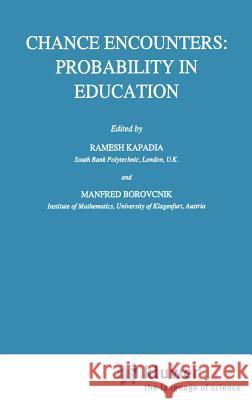Chance Encounters: Probability in Education » książka
Chance Encounters: Probability in Education
ISBN-13: 9780792314745 / Angielski / Twarda / 1991 / 267 str.
This book has been written to fIll a substantial gap in the current literature in mathemat ical education. Throughout the world, school mathematical curricula have incorporated probability and statistics as new topics. There have been many research papers written on specifIc aspects of teaching, presenting novel and unusual approaches to introducing ideas in the classroom; however, there has been no book giving an overview. Here we have decided to focus on probability, making reference to inferential statistics where appropriate; we have deliberately avoided descriptive statistics as it is a separate area and would have made ideas less coherent and the book excessively long. A general lead has been taken from the fIrst book in this series written by the man who, probably more than everyone else, has established mathematical education as an aca demic discipline. However, in his exposition of didactical phenomenology, Freudenthal does not analyze probability. Thus, in this book, we show how probability is able to organize the world of chance and idealized chance phenomena based on its development and applications. In preparing these chapters we and our co-authors have reflected on our own acquisition of probabilistic ideas, analyzed textbooks, and observed and reflect ed upon the learning processes involved when children and adults struggle to acquire the relevant concepts.











